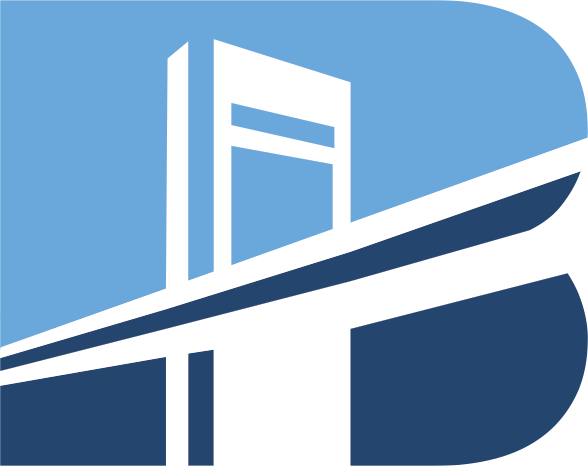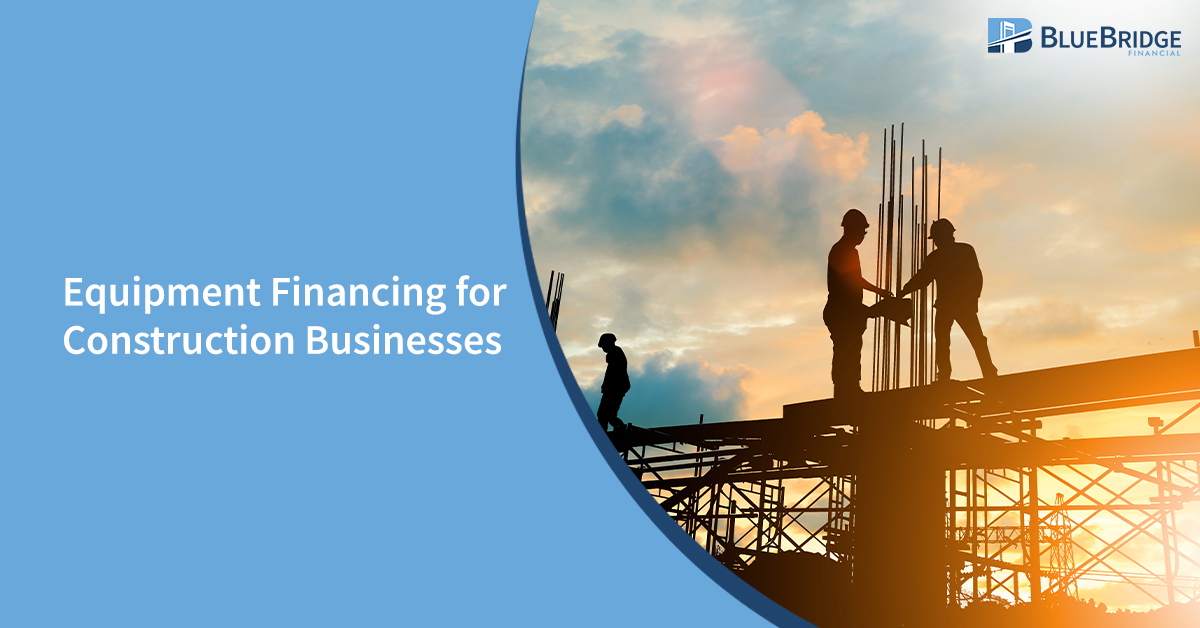Equipment Financing For Construction Businesses
Build Bigger, Smarter, Faster: Financing Solutions for Construction Businesses
Construction has always been a tough, yet rewarding, industry to operate a business in. Some of the challenges faced by construction business owners include low profit margins, fluctuating cash flows, labor and material costs, and the stress of constantly bidding on jobs. But then you pass a building or other project you worked on and it’s so rewarding to see physical proof of your efforts and talent.
Winning contracts is how construction companies make money and stay in business. Before you know whether you have the winning bid, you need to have the right equipment to handle the specifics of that particular contract. At the same time, asset production is still recovering from COVID supply chain issues. Purchasing a new piece of equipment from the factory may mean waiting weeks or even months to get and be able to use that item. So, how can you balance the costs of owning and operating construction equipment with the need to be ready for the next job you win? In this article, we’ll cover everything new construction businesses need to know about equipment financing.
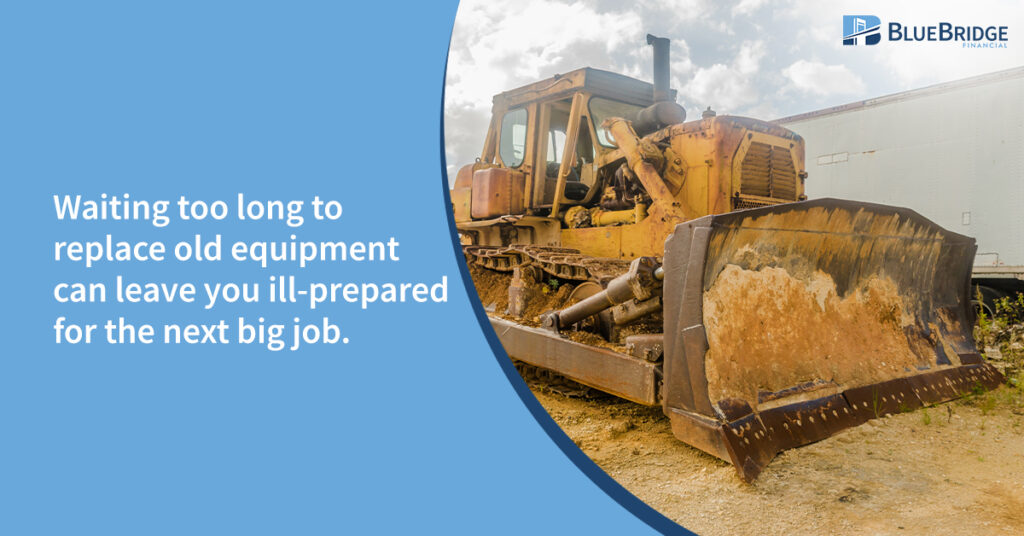
When It’s Time To Retire Old Equipment
First, you need to figure out when to retire old equipment and replace it with something newer. Acting too soon could mess up your cash flow, but waiting too long could leave you ill-prepared to accept a big job. Here are some common signs that your equipment is at the end of its useful lifespan.
- Downtime for repairs or maintenance is becoming more frequent.
- The model is old enough that spare parts have been discontinued.
- Similarly, it may be getting more expensive to buy replacement parts for older equipment.
- Safety risks are increasing due to human error and a lack of the latest technology.
Use Depreciation To Plan For New Equipment
Depreciation is a way to measure an asset’s useful lifespan and declining value over time. For example, let’s say you purchase a $100,000 piece of equipment with a 10-year useful life. Using straight-line depreciation, you deduct the same amount (120th of the purchase price) from the asset’s value every month. This has implications for both your company’s balance sheet (that monthly portion moves from your balance sheet to your expenses) and tax bill (expensing that monthly chunk of the asset’s value lowers your net income and profit, reducing your tax bill).
For construction companies, depreciation is a consideration for capital expenses such as a new equipment purchase. While you may simply purchase new equipment because the existing item is obsolete or you have a new product or service offering that requires new equipment, you may also want to take advantage of accelerated or “bonus” depreciation that enables you to write off most of the cost of your new equipment in the year it was purchased. This tax benefit, as well as depreciation’s overall positive impact on your cash flow, can make it easier for your business to afford monthly loan payments on a new piece of equipment.
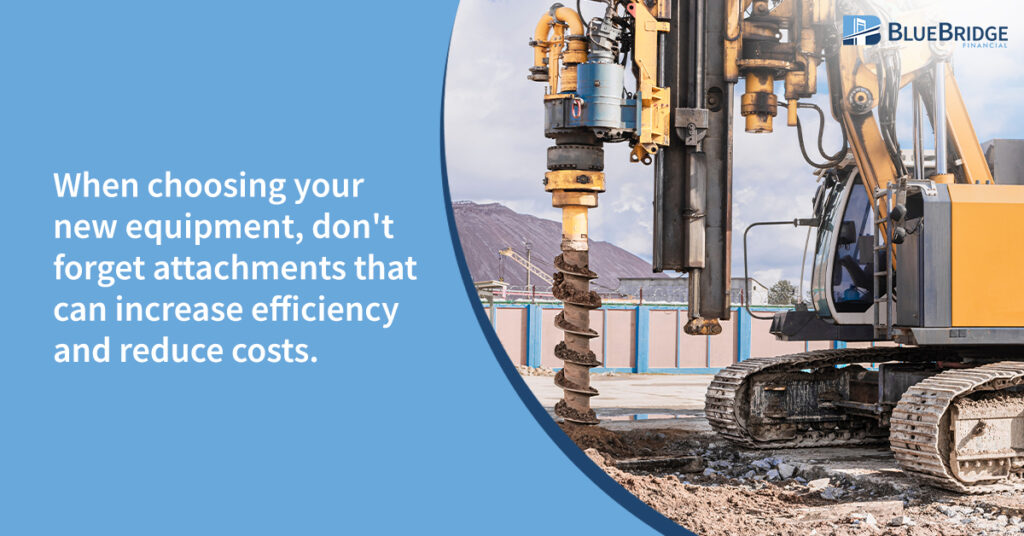
How To Choose New Equipment
Once the time is right for your new equipment purchase, it’s important to choose the right equipment for the job at hand, as well as to maximize efficiency. Some of the most popular construction equipment includes:
- Mini and Regular Excavators: Digging and trenching
- Skid Steers: Material handling, site clean up, and landscaping
- Compact Truck Loaders: Earthmoving, site preparation, material handling, and landscaping
- Cranes: Lift heavy objects, lower materials, and move things horizontally.
- Forklifts: Move heavy loads on construction sites.
- Dozers: Earthmoving, land clearing, rough grading, and site preparation
- Backhoe: Excavation, earthmoving, and utility installation
- Scrappers: Land grading, earthmoving, and hauling
- Dump Trucks: Bulk materials transportation
Attachments For Construction Equipment
Get the most out of your specialized equipment with attachments that can increase efficiency and reduce costs. Popular construction attachments include augers, grapple buckets, blades, tillers, forks, backhoes, rakes, shears, and compactors.
Other Considerations For Choosing Construction Equipment
- How affordable and accessible will spare parts be?
- Is after-sale service available?
- What type of job site will I be using this equipment on?
- Track vs. Wheeled Equipment? Track loaders and other equipment are generally better for tight maneuvering and soft surfaces.
- What is the maneuverability value? How easy will this piece of equipment be to operate, transport, and load or unload?
- Do you want a fuel-powered piece of equipment, 100% electric, or a hybrid model?
- What is the total cost of this piece of equipment, including the purchase price and all the expenses (maintenance, repairs, fuel consumption, insurance, and disposal) associated with owning and operating it?
- Would this type of equipment be a good option for buying used instead of new?
- Will the size of this equipment match other units in your fleet?
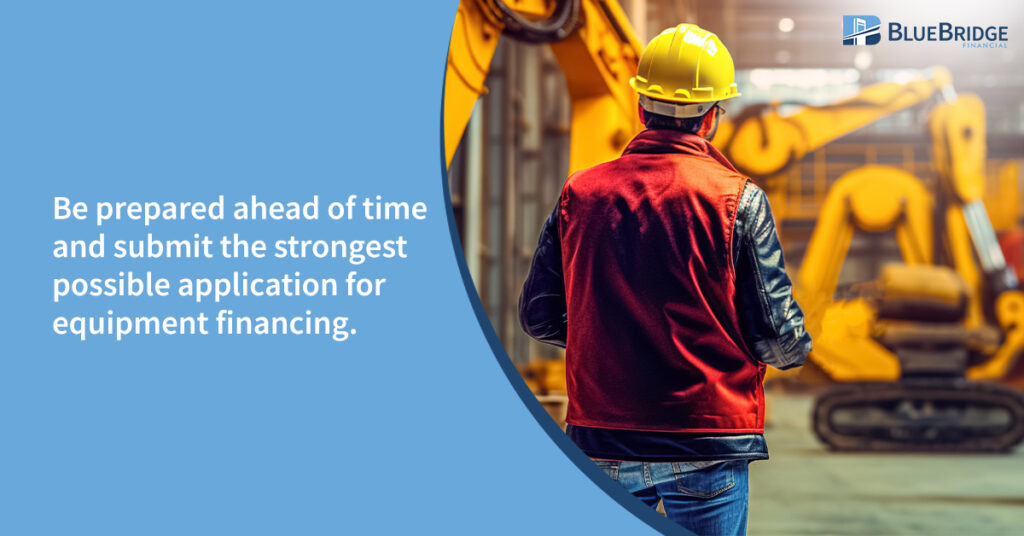
What Equipment Lenders Are Looking For In Your Application
You know what kind of equipment you need and you’re ready to purchase it. Now you just need to secure a construction equipment loan. While captive finance companies may provide the best rate possible, they are stricter about qualifications for a loan. Like a regular bank, they often only consider customers with an established business, 675+ FICO scores, and only those customers who are buying new or almost-new equipment.
On the other hand, Blue Bridge Financial offers a wider credit window, can do start-up transactions, and doesn’t have any restrictions on asset age.
In general, construction companies need a lot of equipment and a network of lenders to work with. This helps you avoid hitting exposure maximums and funding caps.
Learn what lenders are looking for in your application for construction equipment financing. This will help you submit the strongest possible application.
- Financial Statements: Your construction business’s balance sheet, income statement, and cash flow statement will help your lender assess your business revenue, cash flow, profitability, and debt-to-income ratio. The stronger your financial position, the better.
- Credit Score: Lenders may want to see your business credit score, if you have one, and/or your personal FICO score. The higher your credit score, the less risk you present to lenders.
- Collateral: The equipment you’re financing can serve as collateral for the loan. You may need to show a maintenance and upkeep plan for minimizing depreciation during the loan term.
- Loan Principal: This is the amount you’re borrowing, after any down payment you make. Lenders want to be sure you can afford the monthly payment associated with your loan amount.
- Personal Guarantees: Sometimes you may need to give a personal guarantee for your business loan.
- Economic Conditions: As well your specific business situation, trends and forces in the broader economy can also affect your equipment loan application. For example, the 2021 “Investing in America” infrastructure bill has increased funding for projects, a positive development for construction businesses. At the same time, higher interest rates have made it more expensive for businesses and consumers to borrow money, affecting the home building industry, commercial real estate, and more.
Partner with Blue Bridge Financial for your Equipment Financing!
Don’t settle for anything less than an experienced construction equipment lender like Blue Bridge Financial. We are your construction industry expert with over $57 million in Heavy Construction and Specialty Trade loans. The construction industry is all about seasonality and timing, and equipment can make up some of the biggest costs on your bottom line. We can help you get the equipment financing you need, when you need it, with loan terms that fit your budget.
In addition to our standard equipment financing options, new construction businesses can apply for our Start Up or Young Company programs. The start up program is for businesses with 0-2 years in operation and Young company is for businesses with 1-2 years in operation. These loan programs are designed to help new construction businesses obtain the financing they need. Contact us to learn more about loan requirements and start the application process.
Any Questions? We'd Love to Talk:
About the Author
Nick Devernis is the Vice President of Business Development with expertise in credit analysis and equipment financing. With over 6 years in equipment financing, he offers a wealth of knowledge to readers of Blue Bridge Financial’s blog. He currently oversees the California office and leads the Sales and Marketing departments. Nick’s role as Vice President of Business Development involves management of the sales team, relationship management, and developing strategic partnerships to drive inbound and outbound originations.p> LinkedIn Profile
